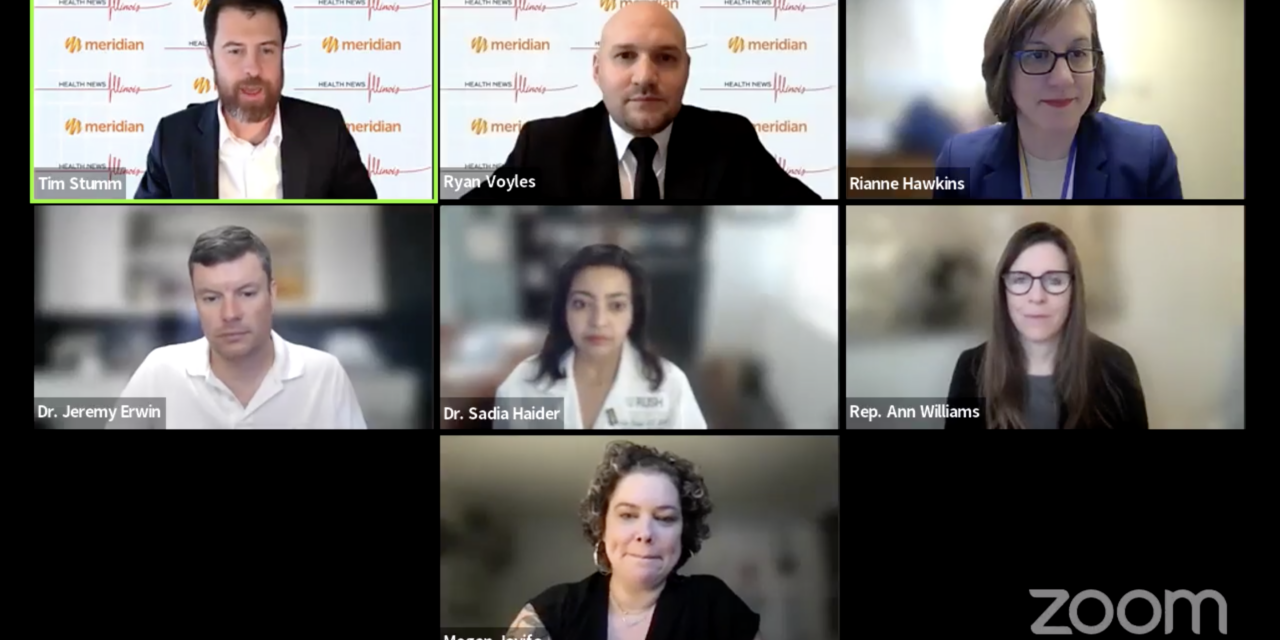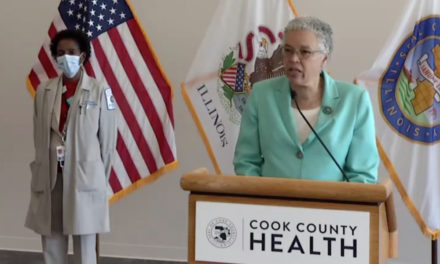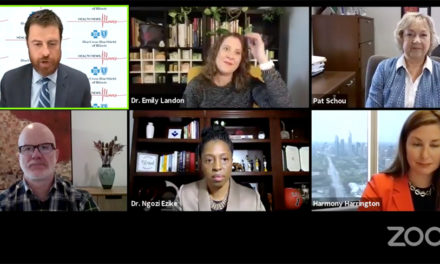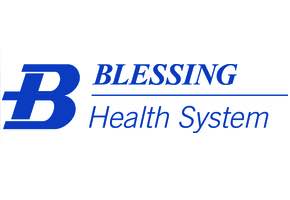
Panelists weigh in on possible abortion-related policies, technology to connect individuals to services

Health News Illinois convened a panel of experts this week to look at the future of reproductive healthcare services in Illinois, from expanding access to care to legislation to protecting providers from litigation.
Panelists included:
Dr. Sadia Haider, Director of the Division of Family Planning, Rush University Medical Center
Megan Jeyifo, Executive Director, Chicago Abortion Fund
Rianne Hawkins, Director of Advocacy and Campaigns for Planned Parenthood Illinois Action
Rep. Ann Williams, D-Chicago
Full video of the event here.
Edited excerpts below:
HNI: When might lawmakers bring forth abortion-related legislation in Illinois?
Rep. Ann Williams: I think it depends on where the working group plans. I know that on some of these topics, we do need to pass legislation. Some of it may be budgetary related. We need to probably ensure that there are adequate resources for the entities doing the hard work every day on the front lines. So it could be a combination of things. We also, I think, want to include an educational component to anything that we produce in terms of a report. People need to know that things like maternal child welfare and healthcare resources are important now more than ever, that the safe haven laws are tied into the abortion discussion, that data privacy is at the forefront of this conversation as well. So educating colleagues and the public at large as to what has shifted in so many areas as a result of (Dobbs v. Jackson Women’s Health Organization), not just access to abortion, but an array of issues relating to that.
HNI: Other states have may seek legislation to allow plaintiffs or prosecutors to sue or prosecute individuals who come to Illinois for services. What could the ramifications of such policies be here for medical providers?
Dr. Sadia Haider: Unfortunately, the result of Dobbs has been that there’s a lot of confusion, chaos and fear resulting from some of these policies. So I have colleagues in other states where there are a lot of restrictions and they’re constantly having to evaluate whether they are doing the right thing for their patients, which is what they want to do. They ethically and morally feel obligated to do the right thing for the patient, but the fear of prosecution or making the wrong decision — not medically, but from a legal standpoint —can cause them to be in a state of a lot of fear when they’re providing care. I feel very fortunate to be here in Illinois. I think we’ve talked about how Illinois is incredibly supportive of our patients and our providers doing abortion care. So I think within Illinois, I can speak for myself and my team here at Rush, we feel that we can take care of patients coming from other places. We feel we have the ability to do so we feel empowered to do so. But I think this is a real issue that I don’t think there’s a good answer for. I think these are questions that across the country we’re grappling with daily.
Rianne Hawkins: We just don’t know. This is a legal gray area that really ends up hurting patients more than anything. Because if a doctor is uncertain how to proceed with care, having multiple pressures being put on them, it ultimately affects the patient and their ability to seek the care that the doctor and the patient agree needs to happen. It’s tough to say. This is all uncharted and new territory. But I will just add that it has created that level of confusion and doubt and uncertainty around the ability of medical professionals to do what they feel is right with their patients to offer that level of care.
HNI: What can policymakers here in Illinois do to help?
Megan Jeyifo: I think that Illinois has done so much to affirm abortion as healthcare in this state. We are not situating abortion care separate from other kinds of healthcare in most instances. I think what, at the Chicago Abortion Fund, we’d love to see kind of in that same line is $0 copays for abortion care for privately insured Illinoisans. That sends a very clear message that we want to be the same as House Bill 40 did when it mandated Medicaid coverage for abortion care for people who are Medicaid recipients. We should be making sure that we can do that same thing for privately insured Illinoisans. And I think also there is kind of like a public awareness piece of this, particularly when we think about crisis pregnancy centers that outnumber clinics here in Illinois. When people are traveling and figuring out how to travel on their own, perhaps without the help of an abortion fund, they are very likely to come face-to-face with a crisis pregnancy center and could be making appointments and traveling all the way to Illinois to see a fake doctor at a fake clinic and get fake information and not be able to access the care that they need. So I think we could take some great communication steps here in Illinois to make sure that people are aware of what a real clinic is and what a fake clinic is. And in a smaller way, I think we always encourage people and individuals to talk about abortion every single day, talk about why abortion access matters, to talk about it with your kids. This is a family issue. This does affect families. And so the more that we can kind of have this narrative in our state that we believe abortion is healthcare, that travels down to our places of worship, the soccer field, whatever it is.
HNI: Are there still areas in Illinois where we’re seeing any gaps in access to reproductive healthcare services? And if so, what can be done to address that?
Rianne Hawkins: I think we’ll have to look at some creative solutions. But what comes top to mind is southern Illinois and western Illinois. There are fewer people in those areas of the state, but it doesn’t mean that those areas of the state are less deserving of care. And for a number of different factors, the number of providers in those areas of the state just isn’t there. Now, we might see some private providers come in. I think we’ve already seen a private provider come into southern Illinois, but there’s always more that can be done, and we’re looking for solutions to be able to provide that care, whether it’s through private doctors to private clinics, I think we would be in favor of expanding access totally throughout the whole entire state.
Rep. Ann Williams: We really are working very closely with the providers and organizations like the Chicago Abortion Fund, Planned Parenthood, ACLU and others to really get the answers as to what they need or get the understanding really of how the work they’re doing, how it could be improved. What we can do on the state level is to make sure that they’re able to continue their work, especially as the demand increases exponentially. One other topic that we have also covered, that’s going to be impacted really by the dynamic we’re seeing in many states is the issue not just of abortion care, but of gender-affirming care and the services that Illinois is already somewhat of an island as compared to many of our surrounding states. And we heard in our working group from activists as well as practitioners in states that are looking to severely curtail the access to those sorts of services. And just like reproductive healthcare, Illinois has become not just a place for people to go and turn to, but a beacon of hope for people that feel that they are not in a safe and supportive environment. I think we can’t overlook, and this is a little bit beyond your question, but I don’t think we can overlook something that we don’t talk about a lot. And that’s the fact that the Dobbs decision, just by virtue of ending what we’ve all — at least everyone on this call has lived with most of our lives — really took an emotional toll … So as a woman, and with 50-plus percent of the population and plus when you take into account other communities accessing reproductive healthcare services, we just lost a big chunk of our rights. It really makes you feel not just concerned about your own reproductive healthcare future or that of your children or family members, but really of your place in society and your value as a human being. And I think that is going to continue to take a toll.
HNI: California voters this fall approved amending their state constitution to guarantee the right to abortion and contraception. Is that something that lawmakers may consider doing here in Illinois?
Rep. Ann Williams: We did codify the right to access safe and legal abortion within the Reproductive Health Act that was passed. And that was an important step forward for the Legislature to affirm that right. That was before, of course, Roe fell, but I think there is a desire to codify it and put it in the Constitution. I know that it’s been really positive for me to see what’s been happening in other states, to see even in conservative states like Kansas that the majority of people are where we thought they were, and that is supportive of the ability to access and make your own healthcare decisions. I know there’s an interest in exploring the issue. Of course, I think Rianne and others have said, this is uncharted territory. If we are going to do it, we want to do it right. We want to make sure there’s no room for error. So it’s something we’re going to be thinking carefully about before we do move forward with that. But that’s definitely something that’s been considered.
HNI: Reports from other states have discussed how abortion restrictions and bans may affect the training of OB-GYNs and other healthcare workers, as well as medical students. Have we started to see that impact here in Illinois? Are we seeing more medical workers and students starting to come into the state?
Dr. Sadia Haider: Abortion is essential healthcare. It’s part of reproductive healthcare. Comprehensive reproductive healthcare includes abortion care, and that’s an integral part of training, especially in OB-GYN residencies and other healthcare fields as well. We know that almost 44 percent of OB-GYN residents are now living in restrictive environments, which means that they are going to have to find ways, their programs are going to have to find ways to access that training for their residents. The reason abortion care is so critically important to training medical students as well as patient providers that access reproductive healthcare, specifically OB-GYNs, is that abortion care translates into many other aspects of reproductive healthcare. Those same skill sets are seen in patients that are seeking miscarriage management, ectopic pregnancies and complicated pregnancies where there are complexities that need to be dealt with towards the time of delivery. In Illinois, we’ve talked about how really we are in this area where we are able to provide care. We are also able to train our students or residents. We at Rush have been committed to this training for decades. Many of the programs across Illinois are doing the same, and we’ve seen a lot from surrounding states and other states to take in trainees into our OB-GYN residency program to offer the training. We’ve had a lot of requests from students to come and gain education with us. And really, it’s an ongoing conversation. I think the demand is also quite high given how much of the country is affected by this. And so we’re doing our best to accommodate those requests at our own institution. We are partnering with a Wisconsin program to take their residents into our program to get exposure to abortion care. Other programs have reached out as well, and we’re working to see what we can accommodate.
HNI: How has technology been in coordinating care for individuals, especially for those who are out of state seeking care in Illinois?
Megan Jeyifo: It really is kind of like a two-tiered system. If you’re in a state where access to telehealth is legal, you’re in really good shape and that’s an option for you. If you’re in a state where it’s not legal, your options are to get pills illegally and risk being criminalized. So I think there’s this very different situation for you depending on where you live. And I think we’ve seen here in Illinois, telehealth is a great option for people who are in rural communities or who are experiencing wait times getting care at a clinic. It’s very fast and very convenient for people. I think there are some concerns on our end. The majority of telehealth providers do not accept Illinois Medicaid, which is a big gap. Having the national telehealth providers have to accept Medicaid and work with insurance companies, I think, would be really helpful in kind of evening access. And I think there’s perhaps a concern about an overreliance on medication abortion and not explaining the need for procedural abortion. There are many reasons our callers prefer procedural abortion to medication abortion. I can think of one particular person that I worked with recently who was a solo parent to a child and was very concerned that she would be unable to parent her child if something were to happen or through pain or what have you. But the wait time for her to get a procedural abortion was quite long and so she was forced to make this choice. There are also people, we work with people who are unhoused or who don’t want the person or people that they’re living with to know about their abortion, where telehealth or medication abortion is not going to be an option for them. So I think we need to make sure that we’re not overly reliant on medication abortion and make sure that in-clinic procedural abortion under the care of a doctor is available to people, particularly when people are traveling here to Illinois.
HNI: There’s been a movement to give states the ability to ban or restrict access to abortion medications. How could any ban or restriction impact care for individuals nationally as well as here in Illinois?
Dr. Sadia Haider: This is the kind of extension of the immediate implications that we’ve seen with Dobbs. So there’s already limited access to specific procedures and medication abortions in states with restrictive environments. And this extension of that is if there are additional restrictions placed on medications, this is just compounding the issue for patients and providers in those environments. In Illinois, I think we are continuing to be able to provide that full spectrum of reproductive healthcare, and we will continue to do so. with the hopes of not having to have some of those medications restricted in our state. But what it does mean is as a provider, we are very careful when we’re talking to our patients about the implications of when they go back to their state. So, for example, if a patient comes from Wisconsin and we’re taking care of a patient here and they require a medication abortion or medications, we prescribed them so they can access those medications within Illinois and not be put into situations in their own state where these restrictions might be in place that could put them at risk. So it’s another sort of layer of navigation, that as a provider, as a care team, we need to take into consideration, given how things are evolving. And the policies and the legal landscape are changing kind of daily. As a provider and as a care team, it’s hard to know what’s happening in Missouri right now, or in Indiana, or in Wisconsin, often the places where we’re seeing patients from. So we’re just doing our best to really think as proactively as we can … to really think carefully about what we’re doing for our patients and how we can really ensure that they are as safe as possible by trying to wrap all the care for them in Illinois.









